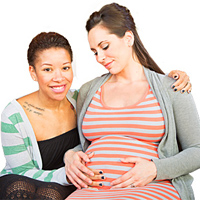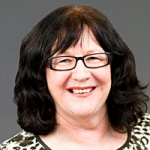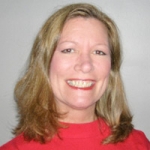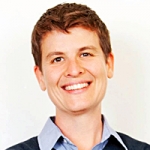
GOLD Learning Online Symposium: Childbirth Education
This Symposium highlights some of the latest research and trends in childbirth education. It will provide you with updates on clinical knowledge and skills with a particular focus on how to present information to the families we work with. This symposium is perfect for anyone who provides prenatal education to families. Learn more about our speakers and their topics by viewing their abstracts and bios.


Geraldine has been involved in breastfeeding support and education for 30 years in Ireland. She works in private practice as a Lactation Consultant doing home visits. She has a major interest in Adult Education and she runs Training of Trainer (Lactation) courses for healthcare professionals in Ireland. She tutors for a group called Cuidiú, training both breastfeeding counselors and childbirth educators.She has organized Peer to peer education for other groups in Ireland and abroad. Geraldine has spoken at many conferences both in Ireland and abroad or a range of topics but her choice usually comes back to her interest in Adult education and the theories around learning styles, groupwork, experiential learning and programme development.
Topic: Learning styles – Certainly Not a One Size Fits All - [View Abstract]
Objective 1: Identify different learning styles of adults
Objective 2: Name adult education theorists and how these affect how information needs to be presented to adults.
Objective 3: enumerate the items of breastfeeding knowledge that is most appropriate to impart at different stages of pregnancy.
Birth workers are usually the first contact with parents and are therefore the people who are best placed to influence them in their choice of infant feeding method. Adults only retain information on a ‘need to know’ basis, so meeting the needs of individuals in your interactions is important. Whether you provide a formal breastfeeding class or just have 5 mins to chat during a prenatal visit, what is the best way for you to provide evidence, which information is important. How can you help parents to make an informed decision about feeding. Adult education theory, learning styles, aims and learning outcomes for your interactions, as well as breastfeeding information will be presented and ideas for how you can make your clients learning fun and interactive.


Jen Kamel is a VBAC strategist, national speaker, and founder of VBAC Facts®. VBAC Facts was born out of her own frustration as a cesarean parent attempting to understand the medical literature and political barriers surrounding VBAC. Her mission is to increase VBAC access through educational programs, legislative action, and amplifying the consumer voice. She envisions a time when every pregnant person seeking VBAC has access to unbiased information, respectful providers, and community support so they can plan the joyful birth of their choosing in the setting they desire. She travels the country presenting her signature program, “The Truth About VBAC” and speaking at various regional and national conferences, including Human Rights in Childbirth, DONA International, and the Indiana Midwives Association. She has testified multiple times in front of the California Medical Board on the importance of VBAC access and is a board member for the California Association of Midwives.
Objective 1: Describe how forced and coerced cesareans take many forms
Objective 2: Analyze how even though many hospitals cite national guidelines and patient safety as the foundation of their policies
Objective 3: Describe the many geographic, financial, and emotional barriers women seeking VBAC face in their quest to exercise their autonomy, mitigate cesarean risks, and plan the birth that is Right For Them.
Are women forced into cesarean surgery? How is this possible? When does it happen? Why does it occur? And what do forced/coerced cesareans really look like? This session will explore the extreme disconnect between medical evidence, national guidelines, ethical responsibilities and the current maternity care system. We will focus on the role of hospital “VBAC bans” which restrict access to vaginal birth after cesarean and mandate repeat cesarean as well as the public health fallout of such policies. We will review how forced cesareans can occur in the face of national guidelines that denounce them while professional ethics simultaneously affirm and honor the autonomy of the pregnant person. Finally we will close with how we can turn the tide, create change, and improve the care our clients and children will ultimately receive.


Birdie is an RN with a Master’s Degree in Psychology/Counseling. She is a past president of Postpartum Support International (PSI), past Chair of Education and Training, and is currently serving as Director of Certification. Birdie is a Perinatal Mood Disorders International Trainer with Postpartum Support International and speaks frequently to communities, nursing schools, grand rounds, and conferences. Birdie specializes in the recognition and treatment of pregnancy and postpartum mood and anxiety disorders. She is the coordinator of the Perinatal Mood Disorders Program at Indiana University Health in Indianapolis, Indiana. Birdie is highlighted as a PMD expert in PSI’s DVD that is shown around the world: “Healthy Mom, Happy Family: Understanding Pregnancy and Postpartum Mood and Anxiety Disorders”.
Objective 1: Describe the spectrum of Perinatal Mood and Anxiety Disorders
Objective 2: Discuss treatment options for Perinatal Mood and Anxiety Disorders
Objective 3: Describe what needs to be taught to a new mom about PMADs
In this session, you will learn about the many faces of Perinatal Mood and Anxiety Disorders–signs and symptoms, risk factors, screening, breastfeeding, and treatment options. You will also learn ways of integrating and teaching useful information about PMADs to your moms and families.


Kristin Kali, LM CPM is a midwife, teacher, writer, speaker, trainer and consultant specializing in LGBTQ family building and gender inclusivity. Kristin is a warm and engaging presence, delivering professionalism and expertise with a down-to-earth, personable style. Kristin is an authoritative resource on LGBTQ healthcare during conception and pregnancy, functional approaches to fertility, and midwifery model preconception care.
Kristin is the owner of MAIA Midwifery and Fertility Services, internationally renowned for LGBTQ family building expertise. In addition to providing preconception care via telemedicine to families across the globe, Kristin provides midwifery care, home insemination, classes and support groups in Seattle, WA. You can read more about MAIA services, download webinars, access professional training, and purchase fertility related products at MAIA Midwifery & Fertility.
Topic: Providing Preconception and Prenatal Care For lgbtq2s Families - [View Abstract]
Objective 1: Define gender and sexual orientation, and relate these aspects of identity to the process of becoming a parent.
Objective 2: Demonstrate ways to protect LGBTQ families from marginalization in childbirth education classes.
Objective 3: Create a specialized childbirth class for LGBTQ families.
Childbirth educators are often challenged to find ways to meet the needs of LGBTQ families in the classroom. This presentation offers an in-depth understanding of what is required to truly hold space for LGBTQ families. Concepts of sexual orientation and gender identity are explained in relation to the transformative experience of becoming a parent. A detailed outline is provided for protecting LGBTQ families against marginalization in the classroom, from advertising and communication with class participants to course materials and the physical classroom space. An exploration of gender inclusive language is included, so that childbirth educators can uniformly discuss pregnancy, birth and infant feeding in ways that are inclusive of new parents of all genders, orientations and family structures. For those who wish to teach specialized classes for LGBTQ families, additional aspects that arise in an exclusive space will be presented.


Penny Simkin, PT, is a physical therapist who has specialized in childbirth education and labor support since 1968. She estimates she has prepared over 13,000 women, couples, and siblings for childbirth. She has assisted hundreds of women and couples through childbirth as a doula. She is author or co-author of books for both parents and professionals, including “The Labor Progress Handbook;” “Pregnancy, Childbirth, and the Newborn: The Complete Guide;” “When Survivors Give Birth: Understanding and Healing the Effects of Early Sexual Abuse on Childbearing Women;” “The Birth Partner: A Complete Guide to Childbirth for Dads, Doulas, and All Other Labor Companions,” She has developed teaching materials for birth classes and produced several videos for educators, doulas, and families , the latest of which is for siblings-to-be, “There’s a Baby.” She is co-founder of DONA International (formerly Doulas of North America) and PATTCh (Prevention and Treatment of Traumatic Childbirth).
Currently, she serves on the editorial board of the journal, Birth: Issues in Perinatal Care, and serves on the senior faculty of the Simkin Center for Allied Birth Vocations at Bastyr University, which was named in her honor.
Today, her practice consists of childbirth education, birth counseling, and labor support, combined with a busy schedule of conferences and workshops.
Penny and her husband, Peter, have four grown children and eight grandchildren from 11 to 28 years of age, two grandchildren-in-laws, and a pug, Lola.
Objective 1: Contrast childbirth education of 20 to 30 years ago and of today.
Objective 2: Analyze the contributions and shortcomings of reliance on today’s major sources of childbirth information - social media, television, videos, and books.
Objective 3: Discuss the consequences of the loopholes for informed women who cannot apply what they have learned to their specific situation.
Penny will explore trends in childbirth education over the past quarter century when childbirth education became marginalized with fewer than half of first time north American childbearing families taking any childbirth classes. Reasons and implications of a poorly informed childbearing public will be discussed. Penny will discuss her perceptions of what is missing in childbirth education today, and will suggest some solutions. She will review knowledge essential for families to make choices in maternity care. Penny calls for more skill building in classes relating to comfort measures and improving labor progress.
Accreditation
CERPs - Continuing Education Recognition Points
GOLD Conferences has been designated as a Long Term Provider of CERPs by the IBLCE--Approval #CLT114-07. This activity is approved for 5 CERPs (4 R-CERPs and 1 L-CERP)
Tags / Categories
(IBCLC) Education and Communication, (IBCLC) Infant, (IBCLC) Psychology, Sociology, and Anthropology, Birth Advocacy, Breastfeeding Education, Cesarean Birth, Childbirth Education, LGBTQIA2S Families & Reproductive Health, Perinatal Mood and Anxiety Disorders
How much time do I have to view the presentations?
- The viewing time will be specified for each product. When you purchase multiple items in your cart, the viewing time becomes CUMULATIVE. Ex. Lecture 1= 2 weeks and Lecture Pack 2 = 4 Weeks, you will have a total of 6 weeks viewing time for ALL the presentations made in that purchase.
- Time for viewing the talks begins once you purchase the product. For Live Webinars & Symposiums, the viewing period begins from when the live event takes place. Presentations can be accessed 24/7 and can be viewed as many times as you like during the viewing period.
What are bundled lectures?
- Presentations may be available individually or via a bundled package. Bundled lectures are a set of lectures that have been put together based on a specific category or topic. Some lectures will be available in both individual and lecture form, whereas others will be available only via a bundled lecture pack.
Will there be Handouts?
- YES! Each lecture comes with a PDF handout provided by the Speaker.
Some lectures include a Q&A, what does that mean?
- During our online conferences, presentations that occur live are also followed by a short 15 minute Question & Answer Session. The Speaker addresses questions that were posted by Delegates during the presentation. We include the recording of these Q&A Sessions as a bonus for you.
How can I receive a Certificate?
- If this presentation offers a certificate, once you are done viewing the lecture or the lectures within a bundle, submit your attendance record in order to be able to download your certificate. You'll be able to see which credits are offered for the lecture by hovering over the "Credits Available" link within the "Speakers & Topics" tab.
Professionals that selected this package also viewed

|
|

|








